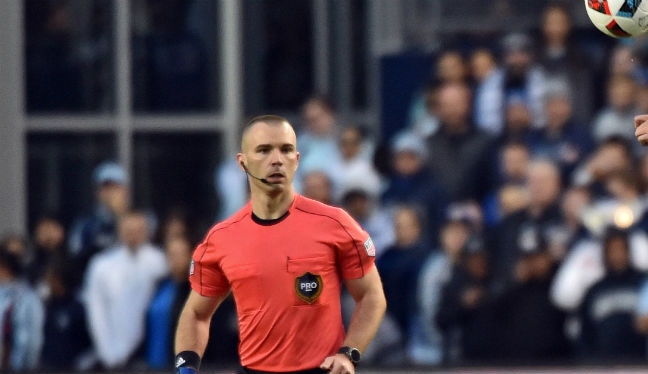Play of the Week 32 – MLS Decision Day: Positioning

By PRO Training & Development Manager Paul Rejer
At a recent camp we looked at a number of penalty area incidents and discussed whether penalty kicks should have been awarded.
When deliberating, it became obvious that positioning overwhelmingly continues to be the number one contributory reason effecting decision-making.
Therefore, as we enter the MLS Cup Playoffs, referees have to ensure they are in the optimum position when making such calls. This week, we are looking at two plays, one in which a PK was denied and one when it was awarded.
The first play is from LA Galaxy versus FC Dallas.
When Galaxy forward Mike Magee goes down deep inside the penalty area under pressure from Dallas defender Ryan Hollingshead, referee Chris Penso is in a fantastic position with a clear view of the incident.
He decides that no offense takes place and, due to his proximity, receives no argument from the Los Angeles players. To be in this wide and deep position, the referee must put in a large degree of effort and work rate.
It enables him to have a better view than an often expected and somewhat outdated position on the edge of the penalty area.
The second play is from the Vancouver Whitecaps versus Portland Timbers game.
Timbers forward
Jack Barmby is tripped inside the penalty area by Jordan Harvey. Referee Alan Kelly squeezes the distance to be closer to his AR, so he has a clear view of any potential incident in that half of the penalty area, which was once considered to be outside the referee’s path of control.
He is therefore in an optimum position and confidently points to the spot. As in the previous play, this proximity results in no argument from the Whitecaps players.
These two plays highlight the effective positioning of
a top-class modern referee. The positions enable the referees to obtain the optimum viewing perspective relative to where the incidents took place, rather than prescriptive positioning on a diagonal from penalty area to penalty area.
To achieve this referees need the following attributes:
– Fitness
– Work rate
– Reading of the game
– Knowing the game and the players
– Instinct
I left instinct until last but, in many ways, it is the most important.
Referees regularly review plays and work on their positioning on the training field but, on matchday, top referees will almost be working in cruise control and will not even be thinking consciously of their position. Their instinct will put them in the optimum position automatically.
If you asked Chris Penso and Alan Kelly why they were positioned where they were, they probably wouldn’t be able to explain, but it would be a combination of all of the above but, importantly, instinct.
Read more: Click here to see other Play of the Week’s from PRO’s Paul Rejer
